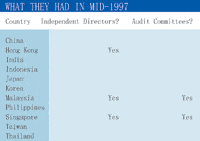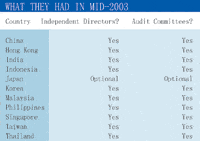Long renowned for their opaque business practices and disdain for minority shareholders, Asias corporations are undergoing a dramatic transformation. They are discovering that good corporate governance is not such a bad thing.

When the Enron scandal hit the headlines back in 2001, there was a certain sense of satisfaction in Asia. Following the economic crisis of 1997, many had become weary of the lecturing by US-led global bodies. They found further comfort in the knowledge that those Asian companies that were destined to fail already hadback in 1997. Yet the regions regulators paid heed. If a feted international blue chip of the likes of Enron could go down in flames, what hope for the rest?
In fact, Enron-like behavior had already been unearthed in Asia. In China in mid-2001, a local paper revealed that a stock marketdarling, Guangxia Yinchuan Industry, had been postingfictitious profits for several years. Exaggerating its financial statements with falsified sales and export figures, the company managed to inflate its net profits by some Rmb745 million (approximately $90 million). Not only was the company discredited but, as with Enron, its auditor was also shamed and eventually stripped of its practicing license by the finance ministry.
Other companies named in local newspapers as having inflated their profits included the state-owned retail company Zhengzhou Baiwen, while Sanjiu Pharmaceutical, Chinas largest pharmaceutical company, was reported to have misappropriated funds to the tune of Rmb2.5 billion.
It is little wonder then that 2001 ushered in the start of Chinas big drive to improve its businesses corporategovernance.Over the next 18 months the country introducedmandatory quarterly reporting (outdoingHong Kong, which remains half yearly) and new regulations stipulating that 50% of a companys directors should be independent.
China is not the only country in the region to seek such reforms. Since 1997 corporategovernance has become a major theme in Asia. According to Jamie Allen, secretary general of the Asian Corporate Governance Association (ACGA), there has been an increasing convergence among the regions regulatory regimes as they move closer to international standards and to each other. The major areas of convergence, notes Allen, are accounting and auditing standards, corporate reportingboth financial and non-financialboardindependence and shareholder rights and legal reforms (see box, right).
These findings are supported by the investment bank CLSAs annual corporate governance survey. Focusing on a number of set criteria, the bank uses a qualitative approach to assess 10 of the regions markets. Its 2003 report, presented in association with ACGA, demonstrates continued improvements, particularly among the mid-ranked countries such as India, Korea, Malaysia and Thailand.
The improvements may be significant, but the reports title, Fakin It, suggests there is still a way to go. While there has been considerable progress in formincluding making publicly stated commitments to good corporate governance, setting up of board committees, appointing nominally independent directorsthere is good reason to believe that the substance is still lacking. The report refers to its system of scoring companies and remarks, Having a better-known system of examining CG scores can defeat the purpose: It makes it easier for companies to put up a fake front and browbeat the analysts preparing the CG score. CLSAs head of Hong Kong research, Amar Gill, who is largely responsible for the report, exudes an air of weary resignation: You cant really know a companys commitment to corporate governance until it is put to the test, he concludes.
 |

|
South Korea is a prime example. It boasted the biggest improvements in its corporate governance score over the past two years, and yet it is there that the SK Corp. scandal recently unfolded. Last year the groups affiliate SK Networksthen SK Globalwas found to have inflated profits by nearly 1.5 trillion won ($1.3 billion) while SK Corp.s chairman Chey Tae-Won, eldest son of the conglomerates founding family, was sent to prison on charges of misappropriation. The saga has continued into the new year: In early January SK Groups chairman, Son Kil-Seung, was arrested on charges of embezzlement and tax evasion.
Actions Speak Loudest
The story is not especially startling. What becomes interesting, however, is how the matter will be handled. Its a test case for corporate governance in Korea, says Allena test he has little faith it will pass. While the government has pushed very hard for corporate governance reforms over the past few years, it is still tempted to bail out the likes of SK Networks on the basis that the impact of its demise on Koreas economy would be too devastating. The failure of SK Networks has impacted negatively upon the rest of the conglomeratethe third-largest business group in Korea. And yet, as Allen points out, this is a company in which three of its directors have criminal convictions for fraud.
Creditor banks, which are often viewed as puppets of the government, have stepped in quickly to help restructure SK Networks with the help of the companys lead shareholder SK Corp. Meanwhile, SK Corp.s top shareholder, Sovereign Asset Management, is attempting to bring about management change at the company but is seeing its efforts thwarted by SK Groups founding family. The family has built up its combined holdings in SK Corp. to some 16%, putting it neatly above Sovereigns 15% stake.

|
|
|
Strong Words, Weak Actions
Levels of enforcement remain a critical issue in Asia. While most countries have delivered a whole raft of new rules relating to corporate governance, there is little in the way of enforcement. To a large degree this reflects the ambiguous stance being taken by the regions governments. Political will is often lacking in countries such as China, Korea and Malaysia, and while it is in their interests to support corporate governance at one level, the governments complex relationships with the largest companies undermine this to a great extent.
The emerging markets are not the only cases in point. Even Hong Kong is compromised, as its stock exchange is the frontline regulator and yet it is a listed company. It is little wonder then that it fails to enforce numerous rules against its listed companies and has allowed some private companies in from China with very dubious backgrounds.
Minority shareholders across the region continue to receive a raw deal. While in theory they can take a matter to court, they are usually prevented from doing so by a lack of supporting legislation. The cost of legal action can be prohibitively expensive, as is the case in Hong Kong, or there may be other large financial hurdles in place, as in Taiwan.

|
|
|
Effective reforms may be slow in coming, but the news for investors is not all bad. As Allen himself notes, the issue is not one of form versus substance but rather form and substance. Given that corporate governance has emerged as an issue in Asia only within the past five years, it is hardly surprising that countries and companies have still only just scratched the surface. Alex Ng, chief investment officer at ABN AMRO Asset Management in Hong Kong, is supportive of the work done thus far: We have to be careful not to be overly cynical about the steps Asian authorities are taking to improvecorporategovernance. Quite a few positive steps have been taken.
Quite obviously, the hardwarethe rules, regulationshave been tightened. But it takes time for the softwarethe practice, the mentality, the cultureto catch up, Ng adds. Allen agrees: Corporate governance is about people and politics. Thats hard to change quickly. It requires incremental internal reform.
Money Talks
While the political changes in Asia may be slow, in some cases the changes driven by the companies themselves are taking place at breakneck speed without any push from rules and regulations. Money often speaks loud and clear, and those companies with international connections, or aspirations, are often motivated to rethink their corporate governance strategy.
The CLSAs findings have provided support for the notion that good corporate governance makes financial sense. According to its 2003 report, those stocks in its top quartile outperformed their markets by an average of 35 percentage points over the past five years. Meanwhile, the bottom quartile underperformed by an average of 25 percentage points.
Lionel Kwok, chief investment officer at BOCI-Prudential Asset Management in Hong Kong, believes the changes need to come from all sides and in a spirit of cooperation. Corporate governance is not a one-sided story,he explains. It comes down to the individual companywhether it will follow the rulesbut you need cooperation and relationships between the regulators, the stock exchanges, as well as the companies and investors.
Fiona Haddock



